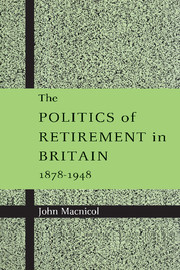Book contents
- Frontmatter
- Contents
- List of tables
- Acknowledgements
- Part I The campaign for old age pensions
- 1 Introduction
- 2 The nineteenth-century background
- 3 Blackley, Chamberlain and Booth
- 4 The opposition of the Charity Organisation Society
- 5 The attitude of the friendly societies
- 6 The labour movement and the state
- Part II Contributory pensions
- Part III The debate on retirement pensions
- Part IV The ‘Beveridge revolution’
- Index
4 - The opposition of the Charity Organisation Society
Published online by Cambridge University Press: 01 October 2009
- Frontmatter
- Contents
- List of tables
- Acknowledgements
- Part I The campaign for old age pensions
- 1 Introduction
- 2 The nineteenth-century background
- 3 Blackley, Chamberlain and Booth
- 4 The opposition of the Charity Organisation Society
- 5 The attitude of the friendly societies
- 6 The labour movement and the state
- Part II Contributory pensions
- Part III The debate on retirement pensions
- Part IV The ‘Beveridge revolution’
- Index
Summary
Until the mid-1890s, the campaign for old age pensions was a broadly conservative movement – part of a raft of proposals aimed at restoring the Poor Law to administrative virtue and imposing harsher discipline upon the able-bodied male; its conservatism was also evident in the unwillingness of pension advocates (Booth excepted) to contemplate anything other than contributory insurance funding. However, from the mid-1890s onwards, the labour movement eagerly and gratefully took up the issue of old age pensions and turned it into something very different. Booth was the first to cross the ideological Rubicon and support the labour demand for non-contributory, universal pensions; others (such as Canon Barnett) followed him. But until the mid-1890s the old age pensions movement was hampered by several enormous obstacles. As we have seen, the inherent limitations of all contributory insurance schemes was one. Another was the perceived impossibility, in the political world of Gladstone and Salisbury, of raising the public finance necessary to fund even a limited contributory scheme like Chamberlain's. A third important obstacle was the opposition of two interest groups – the Charity Organisation Society and the working-class friendly societies. For very different reasons, these two powerful vested interests mounted a strong rearguard action against state old age pensions. By the end of the 1890s, however, the opposition of each was waning, and the initiative had been seized by socialists who viewed pensions as a piece of radical social policy. This chapter will consider the first of these interest groups.
- Type
- Chapter
- Information
- The Politics of Retirement in Britain, 1878–1948 , pp. 85 - 111Publisher: Cambridge University PressPrint publication year: 1998



